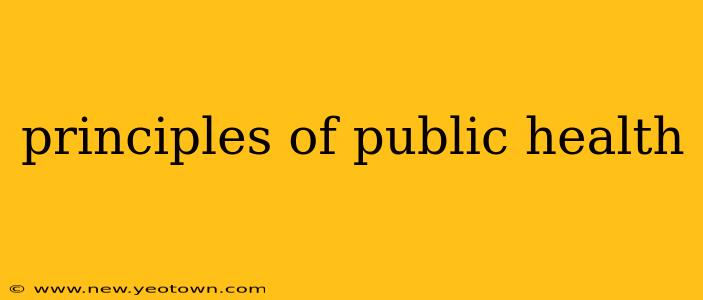Public health isn't just about treating individuals; it's about safeguarding entire communities. It's a complex tapestry woven from various principles, each thread crucial to the overall strength and resilience of the fabric. Imagine a bustling city – its health depends not just on individual well-being but on the interconnectedness of its systems. That's where the principles of public health come into play.
Let's embark on a journey to explore these fundamental principles, unraveling their importance and impact on our lives.
What are the Core Principles of Public Health?
The core principles of public health are multifaceted and interconnected, but we can broadly categorize them into several key areas. These aren't rigid rules but rather guiding lights, adaptable to different contexts and challenges.
1. Prevention over Cure:
This is the cornerstone of public health. Think of it as proactive rather than reactive healthcare. Instead of solely focusing on treating diseases after they emerge, public health emphasizes preventing them in the first place. This involves identifying risk factors, implementing preventative measures like vaccinations and promoting healthy lifestyles. Imagine a town investing heavily in clean water infrastructure and sanitation – a preventative measure that ultimately saves lives and reduces the burden on healthcare resources compared to treating countless cases of waterborne illness later.
2. Social Justice and Equity:
Public health recognizes that health isn't evenly distributed. Certain populations face greater health disparities due to factors like poverty, discrimination, and lack of access to resources. This principle emphasizes the need for equitable access to healthcare, resources, and opportunities to improve health outcomes for all, regardless of socioeconomic status, race, ethnicity, or other factors. The story of a community overcoming health inequalities through targeted interventions is a testament to this core value.
3. Population-Based Approach:
Public health isn't about individual patients; it's about the health of populations. Strategies focus on groups rather than isolated cases. A successful public health campaign might target a whole community to increase vaccination rates against influenza, for example, rather than focusing on individual treatment. The impact on the community's overall health is far more substantial.
4. Evidence-Based Practice:
Decisions in public health should be driven by sound scientific evidence. This means relying on data, research, and rigorous evaluation to determine the most effective strategies and interventions. It's about constantly learning, adapting, and improving based on the evidence at hand. Consider a study demonstrating the effectiveness of a new public health program; this evidence becomes the foundation for future policy decisions.
5. Collaboration and Partnerships:
Effective public health requires collaboration. It's not a solo act; it involves working with communities, organizations, government agencies, and individuals to achieve common health goals. A successful campaign to combat obesity might involve partnerships with schools, healthcare providers, and community groups working in tandem.
Frequently Asked Questions (PAAs) about Principles of Public Health
Here we address some common questions surrounding the principles discussed:
Q: How does social justice relate to public health outcomes?
A: Social justice and equity are central to public health. Health disparities exist due to unequal access to resources like healthcare, education, and healthy environments. Addressing these inequalities through policy changes, resource allocation, and community engagement is crucial to achieving health equity.
Q: What role does data play in public health decision-making?
A: Data is the backbone of evidence-based public health. Epidemiological studies, surveillance systems, and health data analysis provide insights into disease trends, risk factors, and the effectiveness of interventions. This information guides resource allocation and the development of effective strategies.
Q: Can you give an example of a preventative public health measure?
A: Vaccination programs are a classic example. By immunizing a large portion of the population, we prevent the spread of infectious diseases and protect vulnerable individuals who cannot be vaccinated. Similarly, public health campaigns promoting healthy eating habits and regular exercise are preventative measures aimed at reducing chronic diseases.
Q: How do public health agencies collaborate with communities?
A: Public health agencies work closely with communities by engaging with local leaders, community health workers, and residents to understand their specific needs and challenges. They involve the community in the design and implementation of public health programs, ensuring they are culturally appropriate and effective.
Q: What is the importance of ethical considerations in public health?
A: Ethical considerations are paramount. Public health interventions must respect individual rights, privacy, and autonomy while aiming for the greatest good for the population. Ethical frameworks guide decision-making, ensuring that public health measures are just, equitable, and respect human dignity.
In conclusion, the principles of public health are not simply abstract concepts but rather the foundational pillars supporting the well-being of communities worldwide. By understanding and applying these principles, we can create healthier, safer, and more equitable societies for all.

